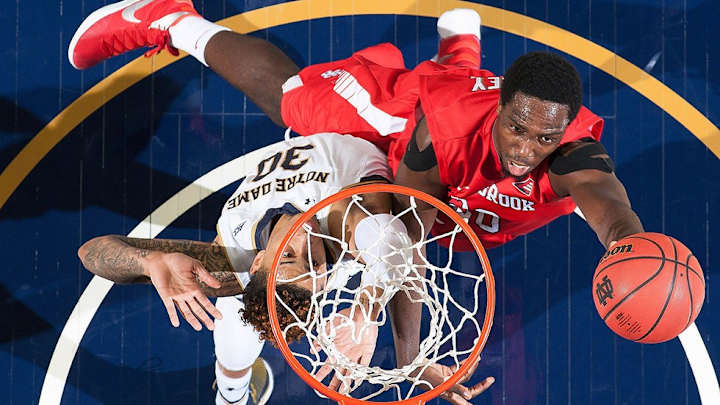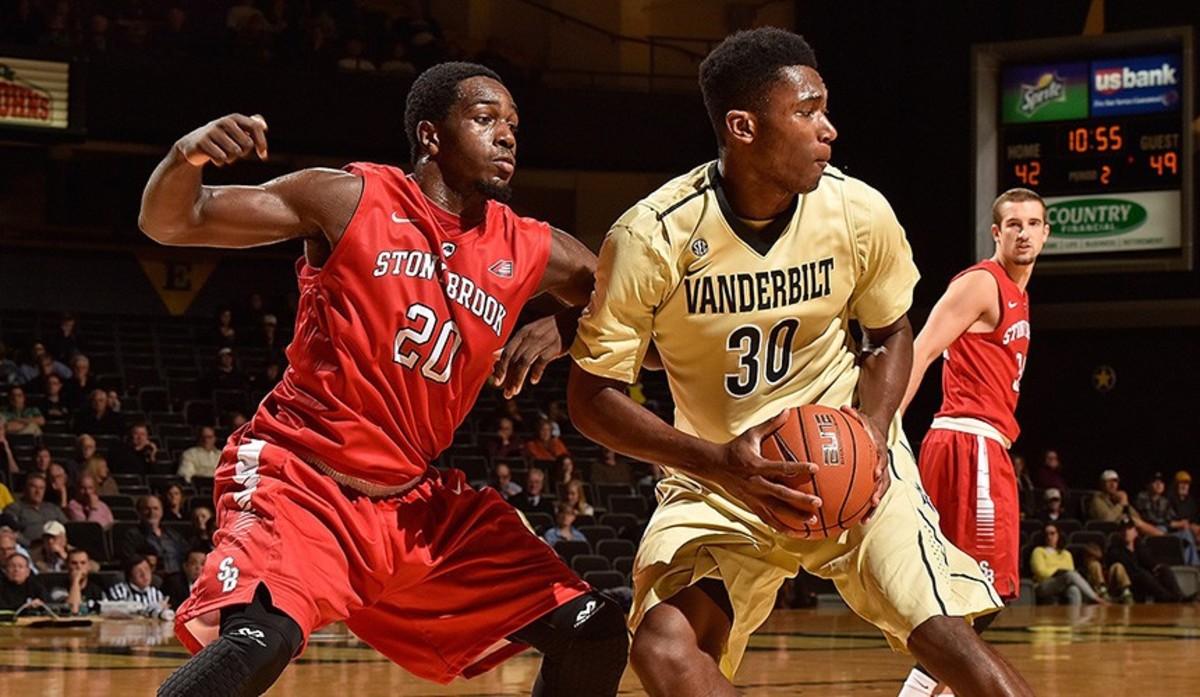Hungry Wolf: Jameel Warney may be college hoops' MVP, but first he wants to make school history

STONY BROOK, N.Y. — Jameel Warney loves Wednesdays. On that day, Stony Brook's Union Commons cafeteria offers a special on gyros—$7.79 for a beef wrap with fries and a drink. And the Seawolves senior forward rarely skips the deal. He refers to it as Gyro Day, and he orders at least two—no vegetables, just meat and sauce—if not three. "Honestly," Warney says, "I'll go to the union five or six times in a day if I'm really hungry—or if I'm just kind of bored."
This Wednesday will hold a special significance for the 6'8", 255-pound Warney, but it doesn't have anything to do with the dining center. His Seawolves have a chance to extend the nation's longest winning streak—it's currently at 18 games—and to do so against Albany, the school that has in back-to-back seasons defeated them in the America East tournament championship game. For Stony Brook, which has never qualified for the NCAA tournament, a win in either game would have been historic. The 22-4 Seawolves have already beaten the Great Danes at home this season, winning 69-63 on Jan. 22, and a victory in Albany would give them a four-game lead with two games left in league play. It would also guarantee them home-court advantage in the conference tournament. The Seawolves haven't lost at home in more than a calendar year.
Warney enters the game just eight points shy of Emeka Smith's school record of 1,978. Considering that Warney has scored in double figures every game this season and has accounted for at least eight points in all 71 games since February of his sophomore year, it's a near certainty that he'll emerge from the game with the record. That would strengthen the already compelling case for the two time America East player of the year to be remembered as the greatest Seawolf ever.
A little more than a decade ago, it would have been difficult to make a case for Warney becoming a collegiate athlete at all. Warney, 22, was raised in Plainfield, N.J., and through elementary school he was known mostly for his weight—classmates called him "Full Court" and "Oatmeal," and those insults hurt. He loved to eat back then, too, and would beg his mom, Denise, to take him to McDonald's every day after school, where he'd order McNuggets, fries, a Sprite and a Cinnamon melt. "I knew she had trouble saying no to me," Warney says, "so I'd try to get her to take me like five times a week at least."
Off the court, Jameel does some things double-double, too. 🏀
— Stony Brook Athletics (@SBAthletics) November 10, 2015
Episode 4: A Gyro, or Two... 🍴
Thanks @SBU_Eats! pic.twitter.com/g5G7P7qo1N
He was determined to become an athlete, and as a kid he tried most sports—without much success. In baseball, he played first base, but struggled defensively because of his size and struck out in nearly every at-bat. He wrestled, but in sixth grade he was forced to face eighth graders and too often found himself on the mat. He tried football too, and defensive end seemed like a natural fit, but Denise was concerned about concussions and didn't let him continue. But when Warney was 11, the mother of one of his friends invited him to try out for her son's AAU team, the New Jersey Hot Shots.
"I was an athlete," Warney says. "I knew that. I just had to find the right sport. I thought that if basketball didn't work out, I'd try soccer or maybe even rugby. But when I started playing basketball, I knew it was right. And I decided I'd do whatever it took to play. I'd lay people out on screens out if I needed to. I'd come in and get five fouls back to back to back if that's what it took. But I would get onto the court."
Before suiting up for the Hot Shots, Warney had only played basketball in his backyard, where he taught himself to heave shots at the backboard because it had a soft spot that allowed the ball to drop straight through the hoop. On his first day of practice, he remembers throwing an overhand "shot" at the glass and watching it ricochet at a teammate. "It looked like it could have killed him," Warney says as he laughs at the memory. But the coach of the team, Jim Burke, saw Warney for more than just his size and pushed him to grow in new ways. At one point, he even dismissed Warney from the team for a week in order to motivate him to be more committed during practices. Warney eventually began spending extra hours at the gym, and under Burke's supervision, he acquired his foundational hardcourt skills.
Burke died unexpectedly in February 2007 at the age of 54. Warney cried at the funeral, understanding even at 13 the path that Burke had provided for him. Burke's successor, assistant Mike Heller, continued to reinforce Warney's game, which eventually caught the eye of Roselle Catholic High coach Dave Boff. The $10,000 tuition was steep, but Warney's family sacrificed all they could to give him the best opportunity. Denise, who is an administrative aide for an insurance company, took out loans, cut out expensive foods and even lost a car in repossession at one point. His sister, Ashley, then a high school senior, stopped looking at four-year universities and decided to attend community college instead. After entering Roselle in the fall of 2008, Warney started as a freshman and began attracting D-I attention as a sophomore, when he averaged 20.0 points, 12.0 rebounds and 4.0 blocks and was named All-Union County. As a senior, he averaged 17.0 points, 13.5 rebounds, 4.0 assists and 3.5 blocks. He graduated from Roselle in spring 2012 as the school's alltime leading scorer.
Stony Brook coach Steve Pikiell first started scouting Warney as a sophomore in high school, and he and his staff attended every single Roselle game they could in hopes of securing his commitment. When Warney took his official visit as a junior, he met with Pikiell in the coach's corner office. Pikiell estimates that Warney said about two sentences over the course of an hour, but perked up when Pikiell told him he could make money playing basketball one day—if he chose the right college.
While a few high-major programs, including Iowa, showed interest, Warney's scholarship choices came down to Rider and Stony Brook. In the summer of 2011, Pikiell was in Ireland, leading Stony Brook through a five-game European exhibition tour, when Warney called him. The connection from New Jersey to Dublin was lousy, but the news was crystal clear: Warney loved his visit to Stony Brook and wanted to stay close to home. He would be a Seawolf.
He hit the weight room right away, trading baby fat for muscle and working toward the sculpted 255 pounds he is now. He started all 33 games as a freshman, leading the teams in points (12.4) and blocks per game (1.5) as well as field-goal percentage (.618) en route to earning America East rookie of the year honors. As a sophomore, he led Stony Brook with 14.5 points and 8.0 rebounds a game and was named the conference player of the year. He won the honor again as a junior, when he increased those averages to 16.7 points and 11.8 boards per game, and his 2.5 blocks per contest helped him be named the America East defensive player of the year as well. This season, he leads the Seawolves in points (19.0), rebounds (10.4), blocks (3.2) and field-goal percentage (.631) And remarkably, in 128 collegiate games, he has attempted zero three-pointers.
"Maybe what I love most about him is that he knows who he is," Pikiell says. "Big men wanting to shoot threes is like a disease in our game. Instead of focusing on those shots, Jameel has developed a deadly post game and is one of the best passing big men in the country. I don't know if he's the best player—but I do know he's the most prepared-for player in our league, if not the country."

Frederick Breedon/Getty
Warney is not the nation's most outstanding player—that would be electric Oklahoma senior guard Buddy Hield—but there's an argument to be made that he is the most valuable. Kenpom.com, which ranks him No. 10 in its player of the year race, credits him with the most "MVP" games (18) of any D-I player. (Each "MVP" is given to the most statistically significant player in a given game.) His offensive rating of 129.0 is 13th best in the country, and his offensive rebounding percentage (14.7%) and block percentage (10.6%) are both top-30 nationally. This season, defenses have double- and triple-teamed him and even employed a box-and-1 defense to try to converge four defenders on him. No strategy has worked. Although Warney lacks a jump shot, he is deadly within 12 feet of the basket, thanks in part to an effective hook shot. That, plus his ability to haul in rebounds and pass out of double teams, will get him NBA looks this summer and will at least help him collect a paycheck overseas playing basketball.
"Jameel is so valuable," says senior guard Carson Puriefoy, the team's second-leading scorer. "Every time he touches the ball, it's an almost guaranteed bucket. When we need to get our offense going, the coaching staff tells us to go inside-out and let Jameel go to work."
Puriefoy, Warney and forward Rayshaun McGrew compose Stony Brook's senior class, the winningest group in school history. But they're still lacking one achievement: A trip to the Big Dance. Pikiell has worked hard to keep his team focused only on its immediate surroundings. At film sessions, he'll show an edit of the team's worst 10 minutes of its previous game so that the players don't think they've been perfect during their perfect streak. And when preparing for an opponent, he asks that they just to go 1–0 in their next game. But he knows how much his guys want to make history.
"It's so hard in one-bid leagues like ours. I played at UConn and I remember going to the Big East tournament joking with teammates and saying, 'Let's finish fifth so we can get some rest,' because we knew we'd make the tournament," says Pikiell, who was a point guard for the Huskies from 1987 to '91. "Here it's one bad bounce, one bad call or one great shot and wait 'til next year."
There is no next year for Warney. There is only what got him here—the failures, sacrifices and successes—and what sustains him now: The occasional gyro, of course, but mostly the community that has surrounded him for four years.
"I have this university on my back," he says. "I love this pressure. If you're complacent, what's the point of living? You've gotta keep growing."
When he was 11, everyone expected Warney to keep growing. But nobody imagined then the big man he would become.
